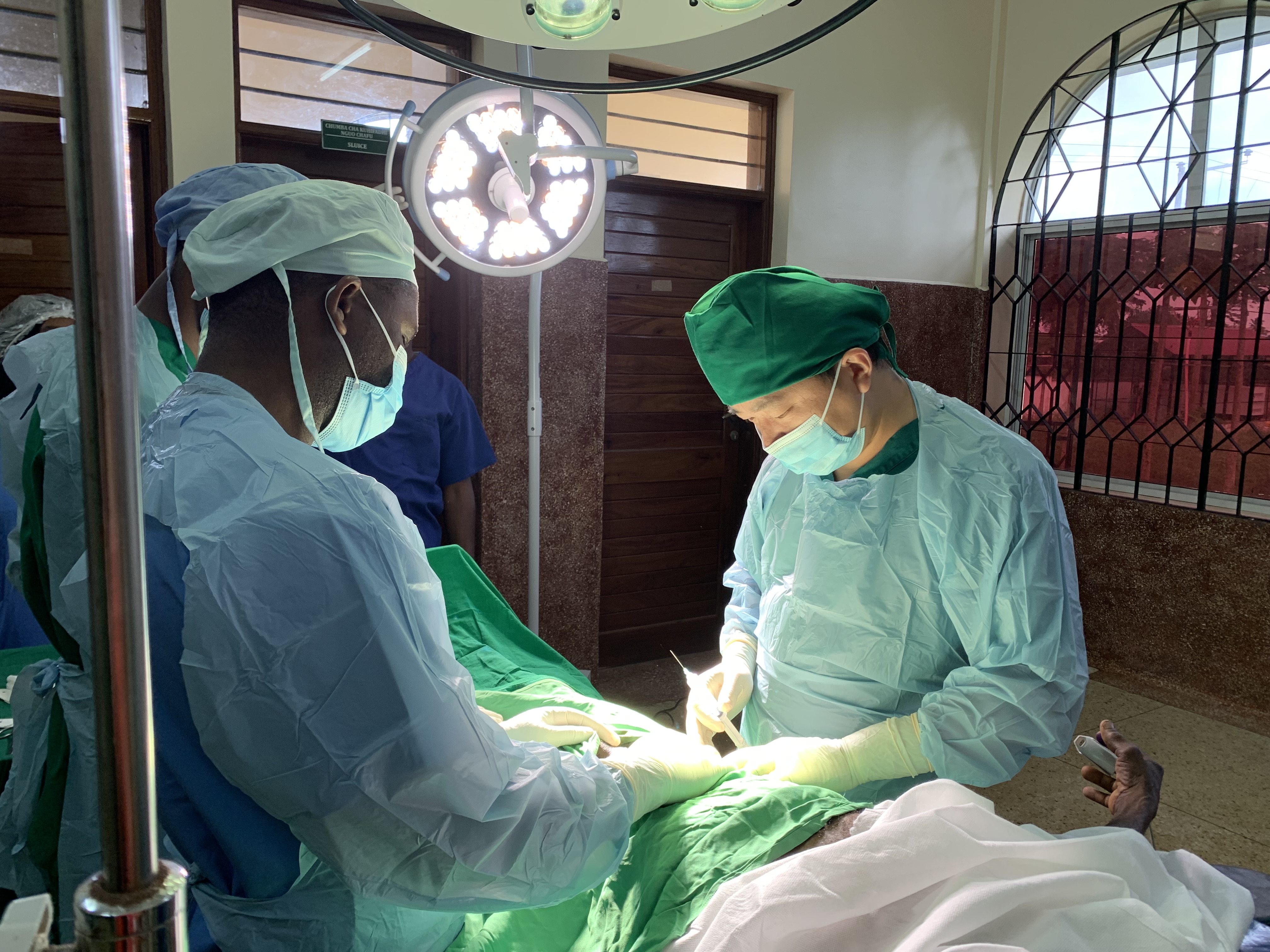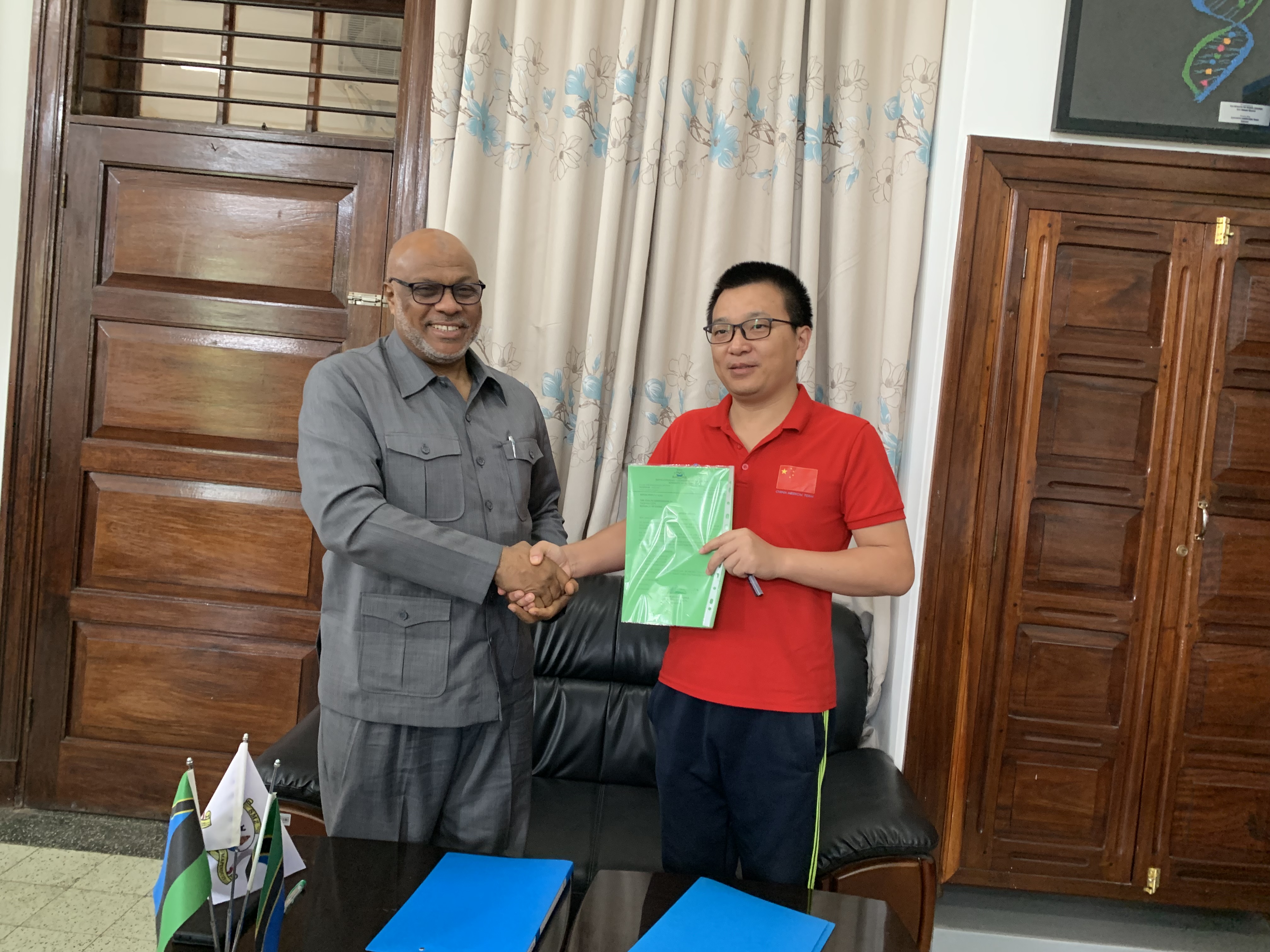难忘的援外岁月 |赵小军: 一个个“不可能完成”的奇迹是这样逼出来的
2023-11-14 01:24:10 来源:泰州新闻网 作者:泰州市人民医院 赵小军
2022年9月26日,我带队抵达桑给巴尔,开展为期一年的援外医疗任务。初到桑岛,就被迷人的小岛自然风光以及民众的热情吸引。
我是普外科医生,在温古贾岛的纳兹莫加医院工作,主要从事胃肠、肝胆胰、复杂腹外疝以及全部的腹腔镜手术,要定期参加科室疑难杂症的病例讨论,还需要24小时on call,随时等待急诊的召唤。正式开展工作后,我才知道当地医疗条件如此低下,医疗物资如此匮乏。
 第一天进手术室,我就被搞懵了。外科医生上台之前只用肥皂水洗手,不用消毒剂!无菌原则怎么办?咨询当地医生,说是没有消毒剂,卫生部没有这项预算。看着空空如也的消毒剂盒子,我是一脸茫然,心情忐忑,虽然这台手术过程很顺利,但是我一直都在惦记着我这达不到消毒要求的双手。
第一天进手术室,我就被搞懵了。外科医生上台之前只用肥皂水洗手,不用消毒剂!无菌原则怎么办?咨询当地医生,说是没有消毒剂,卫生部没有这项预算。看着空空如也的消毒剂盒子,我是一脸茫然,心情忐忑,虽然这台手术过程很顺利,但是我一直都在惦记着我这达不到消毒要求的双手。
没过几天正在做急诊手术时,突然停电,staff跟我解释,这边停电是很常见的事,而且停电时长不能确定,超过24小时,也是可能发生的。听完这些“故事”,我赶紧跟五官科医生借头灯继续完成手术。
大概正式开展工作两个多月的时候,我突然被通知停止慢诊手术两周,原因是卫生部暂时没有足够的预算购买氧气,医院的氧气只能满足急诊手术的需求。如何在这样的条件下完成我们的医疗援助任务,成为摆在作为队长的我面前的重要问题。经过向往期队员请教加上多方调研,我们确信困难客观存在,而且短期内不会有所改变。只能自己克服困难,充分利用现有条件,因地制宜的开展工作,要坚决调整在国内形成的团队协助的工作思维,并且要充分考虑到各种“意外情况”的发生。
随着工作条件及环境的逐渐适应,日常临床工作已经能够轻松完成。为更好的完成援外任务,我们还完成不少创新之举。比如我曾接诊一位贲门失弛缓的年轻男孩,已经到了喝水都吐的地步,胃镜检查并无器质性病变。该疾病的最初采用的治疗方法是进胸行食管下端的环形肌肉切断,甚至行下端食管切除,创伤极大,风险也高,临床使用率不高。随着内镜技术的发展,2009年poem(经口内镜下食管括约肌切开术)手术方式问世,因手术时间短,创伤小,恢复特别快,疗效可靠,迅速成为治疗贲门失弛缓症患者的首选。但是我工作的纳兹莫加医院并不具备行poem手术的条件,患者及其家属访遍整个坦桑尼亚,也未找到具备行poem手术的医院。我和队员以及当地专科医生一起进行多学科讨论,最后决定采用腹腔镜进行手术,术中充分拓展食管裂孔及食管下段周围间隙,确定狭窄部位后,纵行切断肌层,避免损伤黏膜层,再行胃底折叠以减少反流,即腹腔镜下heller dor手术。术后患儿恢复很好。这种手术即便在国内也很少开展,因为这已经不是最佳方案,但是很明显,在桑给巴尔,它还是最优选择。
医疗援助非洲是个艰苦的工作,只有充分发挥自己的潜能,因地制宜的开展工作,才能把工作做得更好。

my foreign aid story began on september 26, 2022, when my team embarked on a one-year medical aid mission in zanzibar. upon arrival, i was captivated by the island's enchanting natural beauty and the locals' unwavering enthusiasm.
as a general surgeon at mnazi mmoja hospital on unguja island, my primary focus lies in gastrointestinal, hepatobiliary and pancreatic surgeries, complex abdominal procedures, external hernia repairs, and laparoscopic surgeries. regularly participating in case discussions for challenging and intricate diseases within the department is part of my routine. additionally, i am required to be available for emergency calls around the clock.
once i commenced my work here, it became evident that local medical conditions were dire with scarce availability of essential supplies. on my first day entering the operating room (or), i was taken aback: surgeons merely washed their hands with soapy water without any disinfectant before proceeding! what about maintaining sterility? consulting with local doctors revealed that there was no disinfectant due to budget constraints from the ministry of health. gazing at an empty disinfectant box left me feeling lost and anxious. despite successfully performing operations under these circumstances, thoughts lingered about not meeting proper hand hygiene requirements.
a few days later during an emergency surgery procedure, power suddenly went out. the staff explained that power failures were commonplace here with uncertain durations; they could last more than 24 hours. hearing these "stories," i promptly borrowed a headlamp from an ophthalmologist to continue completing the operation.
approximately two months into my assignment came an unexpected directive to halt non-urgent surgeries for two weeks. the reason being insufficient budget allocated by the ministry of health to purchase oxygen; only enough supply existed for emergency surgical cases. overcoming this challenge while fulfilling our medical assistance mi
how to complete our medical assistance mission under such conditions has become an important problem in front of me as the team leader. after consulting the members of the yearning period and multi-party research, we are convinced that the difficulties exist objectively and will not change in the short term. we can only overcome the difficulties by ourselves, make full use of the existing conditions, and carry out the work according to local conditions. we must firmly adjust the working thinking of team assistance formed in china, and we must fully consider the occurrence of various "accidents".
with the gradual adaptation of working conditions and environment, daily clinical work can be completed easily. in order to better fulfill the task of foreign aid, we have made many innovations. for example, i once saw a young boy with achalasia of the cardia, who was vomiting when he drank water. gastroscopy showed no organic lesions. the initial treatment of the disease was circular muscle transection of the lower end of the esophagus through the chest, and even lower esophagectomy was extremely invasive and risky, and the clinical utilization rate was not high. with the development of endoscopic technology, peroral endoscopic esophageal sphincterotomy (poem) was introduced in 2009. because of its short operation time, minimal trauma, rapid recovery and reliable curative effect, poem has quickly become the first choice for the treatment of achalasia patients. however, the mnazi mmoja hospital where i work is not equipped to perform poem surgery, and the patient and his family have visited the whole tanzania, but they have not found a hospital that can perform poem surgery. after multidisciplinary discussion with my team members and local specialists, we finally decided to perform laparoscopic surgery. during the procedure, the esophageal hiatus and the surrounding space of the lower esophagus were fully expanded. after identifying the stenosis site, a longitudinal incision was made in the muscular layer to prevent damage to the mucosal layer. subsequently, laparoscopic heller dor operation was performed to reduce reflux through fundoplication. the patient had a successful postoperative recovery. this particular procedure is rarely conducted even in china due to it no longer being considered optimal; however, it is evidently the best option available in zanzibar.
providing medical assistance in africa is challenging work that requires maximizing one's potential and adapting approaches based on local conditions for better outcomes.